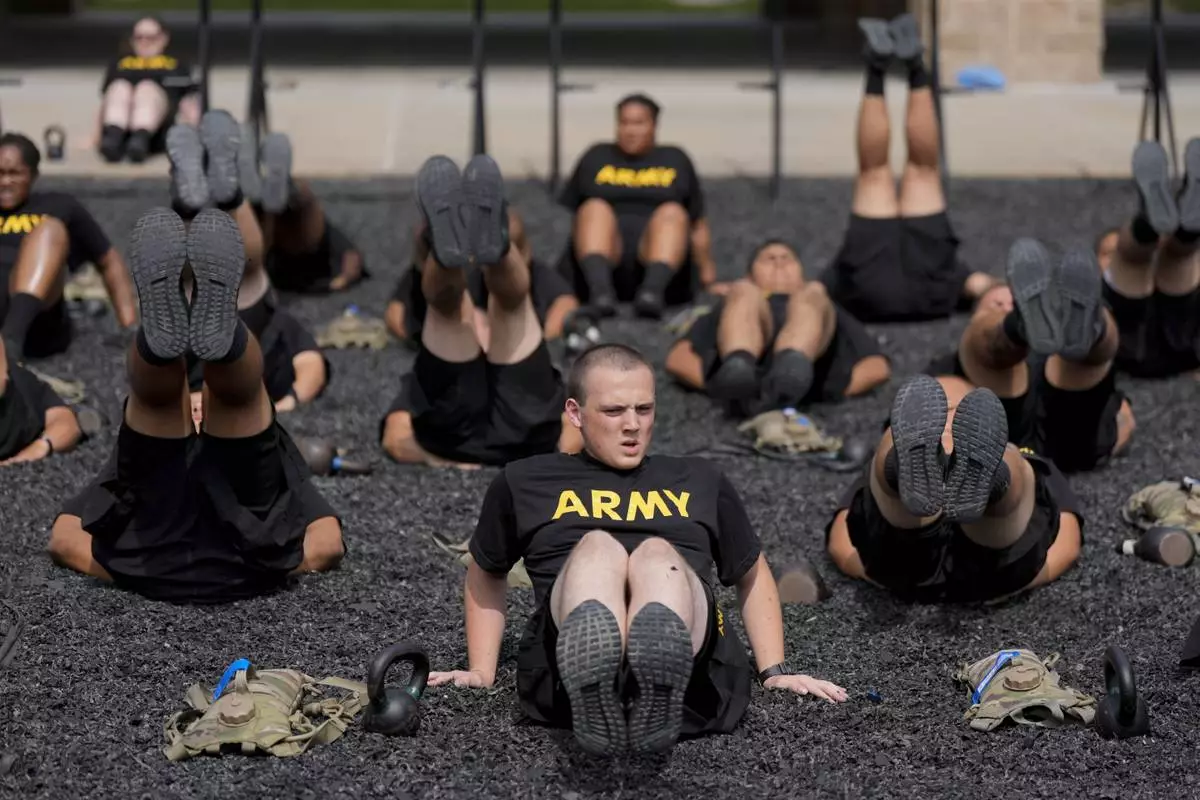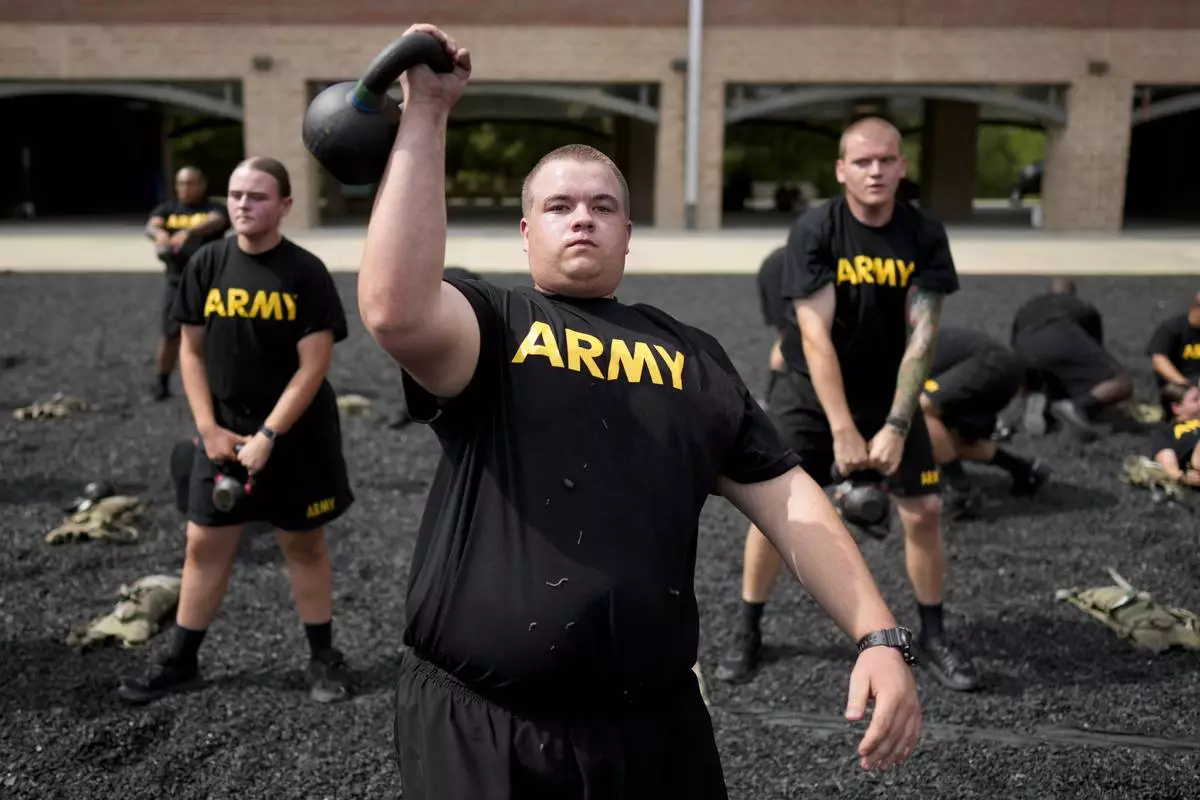FORT JACKSON, S.C. (AP) — Index cards taped to a large board on the wall at Fort Jackson, South Carolina, reveal the sometimes blunt and gritty reasons that new recruits took a chance at a last-ditch program to get into the Army.
“Eviction notices motivate me,” one said. Others talked about getting free college, a good job and a way to better themselves.
Known as the “Why Wall,” the board is meant as an inspiration for the recruits who could not meet the Army's physical and academic test standards, so they went into the Future Soldier Prep Course. It provides weeks of instruction to help them bring up their scores.
Started as a trial program two years ago to help boost dismal recruiting numbers, the prep course is fueling the Army’s enlistment comeback. Recruiting has suffered for all the military branches in recent years coming out of the COVID-19 pandemic, amid low unemployment and stiff competition from private companies able to pay more and provide similar or better benefits.
By the end of this budget year on Sept. 30, the Army had made its recruiting goal of 55,000, and service leaders said more than 13,000 of those recruits — or 24% — came into active duty through the prep course.
Army leaders increased the goal to 61,000 for this year and are relying on the prep course to provide a significant chunk again.
During a recent visit to Fort Jackson, Army Secretary Christine Wormuth spoke with recruits and program leaders to see how the course is going and what changes may need to be made. She said the successful program, which more than 31,000 trainees have gone through since it started, deserves to be made permanent.
Wormuth said the Army may make adjustments based on a long-term study on the recruits coming out of the course, including looking at how well they did in their first enlistment and whether there were behavioral or disciplinary problems.
"We really want to see what kind of soldier kind of comes out at the back end of that first term, how do they do in terms of discipline," Wormuth said.
Drill sergeants have expressed concerns that they are seeing more discipline issues, disrespect and complaints from trainees in the academic course. And they say trainees whose first language is not English have a more difficult time understanding orders and dealing with computers.
While they see fewer discipline issues from recruits in the fitness section, they do see more injuries, including ankle, knee and hip problems. Those trainees, they say, may need to be brought along even more slowly, to increase their strength and conditioning, rather than moving them to basic training the minute they hit the minimum level of requirements.
Commanders told Wormuth that the fitness program aims to give trainees a healthy foundation in eating and working out. Instructors said they do not want to break the recruits before they get to basic training, so they do a lot of yoga, stretching and other exercises to help avoid injuries.
In the classrooms, they are learning basic math, English and other academic skills. The bulk of recruits going through the program are in the academic course.
So far, Wormuth said, the data does not reflect some of the concerns expressed by drill sergeants and commanders. Instead, she and other Army leaders said that on average, the graduation rate from basic training is a bit higher — about 94% — for those who went through the program versus those who did not, which is about 92%.
But so far, they are taking inspiration from the thoughts scrawled on the “Why Wall."
Company commanders came up with the idea last year, to let recruits lay out their goals in their first few days so they can go back every week to get motivated or see their progress.
A bright yellow sign atop the board tells recruits: “Your WHY will keep you going even when you want to QUIT the most.” The answer for many was they had something to prove — to themselves and others.
“I joined the Army because my family thought I couldn’t accomplish anything in life. So I had to prove them wrong,” one said. Another wrote: “I wanna show my family I’m worth something.”
Others said they wanted to “be a better man,” “gain my independence” and “prove to myself that I can accomplish something and I'm not a quitter.”
One recruit was blunt: "To prove to her I’m not gonna turn into who she said I’d become.”
Recruits lined up near the wall told Wormuth that the physical fitness program is working for them.
Couper Godleski, from Pennsylvania, said that in 10 weeks he had lost 20 pounds.
Britney Vaughn, from Louisiana, said she had lost 30 pounds in six weeks. And while she said she is missing her 3-year-old daughter, “I feel like everything will be worth it.”
On the academic side, recruits told Wormuth that even as they struggle with math or English comprehension, they are getting help from instructors while learning the structure and discipline of the Army. A key goal, said one female recruit, is “to be a role model to my nieces and nephews” and get money for college so she doesn't have to be in debt.
For Wormuth, the visit confirmed Army leaders' intention to keep the program going.
Recruiting challenges are not going to end, she said.
“I think we’re going to probably continue to see pretty low unemployment. We’re still going to see 60% go to college. It’s a more competitive labor market,” she said. “So we’re going to have to keep fighting hard for our new recruits.”

FILE - A new recruit participates in the Army's future soldier prep course that gives lower-performing recruits up to 90 days of academic or fitness instruction to help them meet military standards, at Fort Jackson, a U.S. Army Training Center, in Columbia, S.C., Sept. 25, 2024. (AP Photo/Chris Carlson, File)

FILE - Army Secretary Christine Wormuth talks with soldiers at Fort Jackson, a U.S. Army Training Center, in Columbia, S.C., Sept. 25, 2024. (AP Photo/Chris Carlson, File)

FILE - Army Secretary Christine Wormuth walks during a tour with soldiers at Fort Jackson, a U.S. Army Training Center, in Columbia, S.C., Sept. 25, 2024. (AP Photo/Chris Carlson, File)

FILE - New recruits participate in the Army's future soldier prep course that gives lower-performing recruits up to 90 days of academic or fitness instruction to help them meet military standards, at Fort Jackson, a U.S. Army Training Center, in Columbia, S.C., Sept. 25, 2024. (AP Photo/Chris Carlson, File)

FILE - Army Secretary Christine Wormuth talks with soldiers at Fort Jackson, a U.S. Army Training Center, in Columbia, S.C., Sept. 25, 2024. (AP Photo/Chris Carlson, File)

FILE - Army Secretary Christine Wormuth talks with soldiers at Fort Jackson, a U.S. Army Training Center, in Columbia, S.C., Sept. 25, 2024. (AP Photo/Chris Carlson, File)

Army Secretary Christine Wormuth looks over the The "Why Wall," part of the Army's future soldier prep course that gives lower-performing recruits up to 90 days of academic or fitness instruction to help them meet military standards, at Fort Jackson, a U.S. Army Training Center, in Columbia, S.C., Sept. 25, 2024. (AP Photo/Chris Carlson)

Recruits participate in the Army's future soldier prep course that gives lower-performing recruits up to 90 days of academic or fitness instruction to help them meet military standards, at Fort Jackson, a U.S. Army Training Center, in Columbia, S.C., Sept. 25, 2024. (AP Photo/Chris Carlson)

A new recruit participates in the Army's future soldier prep course that gives lower-performing recruits up to 90 days of academic or fitness instruction to help them meet military standards, at Fort Jackson, a U.S. Army Training Center, in Columbia, S.C., Sept. 25, 2024. (AP Photo/Chris Carlson)

Index cards describing why the recruits joined the Army are taped to a large board on a wall at Fort Jackson, a U.S. Army Training Center, in Columbia, S.C., Sept. 25, 2024. (AP Photo/Lolita Baldor)




















